American families are on high alert after a gunman opened fire on Tuesday at Robb Elementary School in us-regions killing 19 children and two teachers.
School districts across the country are increasing security in the wake of the tragedy, which raises questions about how parents and caregivers should speak to their children about violence, and the shooting itself, in an age-appropriate fashion.
“The first thing you need to do is not talk to your kid immediately. You need to take care of yourself first,” Dr. Jill Emanuele, vice president of clinical training at Child Mind Institute in New York City, told Fox News Digital in a telephone interview on Wednesday.
LIVE UPDATES: TEXAS SCHOOL SHOOTING LEAVES 19 CHILDREN, 3 ADULTS, INCLUDING SHOOTER DEAD
“You need to make sure you processed what you just heard and talked to someone,” she also said.
“So, by the time you get to your kid, they’re not picking up on all the emotions you haven’t dealt with yourself already.”
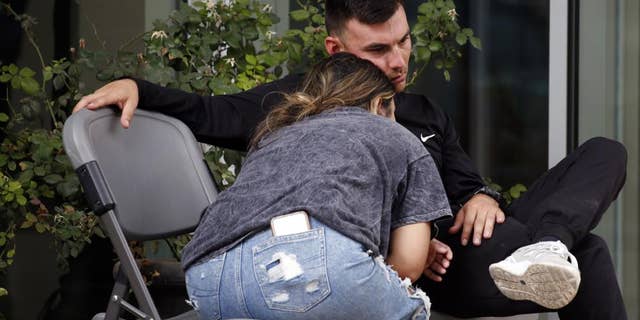
People wait outside the Civic Center in Uvalde, Texas, on Tuesday, May 24, 2022, after an 18-year-old gunman opened fire at Robb Elementary School, killing multiple people.
(AP Photo/Dario Lopez-Mills)
Fox News Digital consulted with Dr. Emanuele as well as with other doctors and psychologists about what parents should say, or not say, to their children who may be worrying about the Texas school shooting and perhaps other tragedies, too.
Here are professional and insightful tips for parents and caregivers.
Address your kids’ safety concerns
If your children are worried about their own safety, Emanuele advised parents to “keep them present” and “in the moment.”
“[Assure your kids] that they are safe right now because we don’t want them to try and predict the future about something that may not happen or does not exist,” she said. “But sometimes, unfortunately, it does happen.”
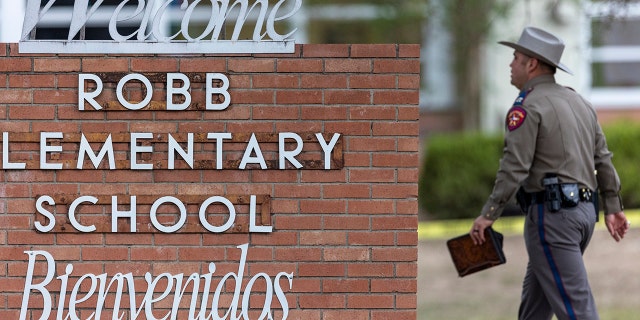
A state trooper walks past the Robb Elementary School sign in Uvalde, Texas, Tuesday, May 24, 2022, following a deadly shooting at the school.
(William Luther/The San Antonio Express-News via AP)
Emanuele suggested learning about the specific safety protocols at school — and include your children after you’ve had those conversations.
“Say, ‘Let’s find out together your school’s plans to deal with these issues. We will make sure you have all the information you need to keep you safe,’” she said.
Dr. Meg Meeker, a Michigan-based pediatrician of more than 30 years — as well as a mother, grandmother, best-selling author and creator of the “Parenting Great Kids” podcast — also said that “giving comfort and empathy to any child who is frightened” is very important.
“Let your child know that you understand the feelings he or she is having.”
— Dr. Meg Meeker
“Make sure to validate your child’s feelings,” she said. “Don’t dismiss any fearful feelings or say, ‘There’s nothing to worry about.’ Let your child know that you fully understand the feelings he or she is having.”
Be the trusted source
“Parents need to assess who their child is going to learn information [from] — and you want to be the one who gets the information to them first,” Dr. Emanuele said.
FAITH LEADERS REACT TO TEXAS SCHOOL SHOOTING: ‘ACT OF PURE EVIL’
In addition, decide the information to gather and ask yourself, “What do I want my child to know?” Emanuele said, explaining how parents of middle and high school-aged kids should learn how their kids are consuming news.
“[Ask them], ‘Where are you looking up information when you’re trying to find out what’s going on? Before you look [that] up, can you come to me first? I’m here for you. Let’s do this together,'” she said.
“Know your kids are listening and watching you.”
— Dr. Mary Karapetian Alvord
Dr. Mary Karapetian Alvord, director of the Rockville, Maryland-based Alvord, Baker & Associates, LLC — and a psychologist specializing in treating children, adolescents and adults — stressed that middle school and high schoolers are on social media and that parents should routinely check in on them.
TEXAS SCHOOL SHOOTING EVOKES FAITH LEADERS’ REPLY: WE MUST PUT ‘PRAYERS INTO ACTION’
“With teens, find out what social media they’re on, what’s being discussed and in what perspectives,” said Alvord, who is author of “Conquer Negative Thinking for Teens: A Workbook to Break the Nine Thought Habits That Are Holding You Back.”
Listen and stay calm; be fully present
It is likely that parents will first want to console their child, Emanuele said.
“In doing so, you forget to listen,” she added. “You really want to understand how they’re hearing the information, how they’re dealing with it and anything else that may be in their minds that you wouldn’t have anticipated.”
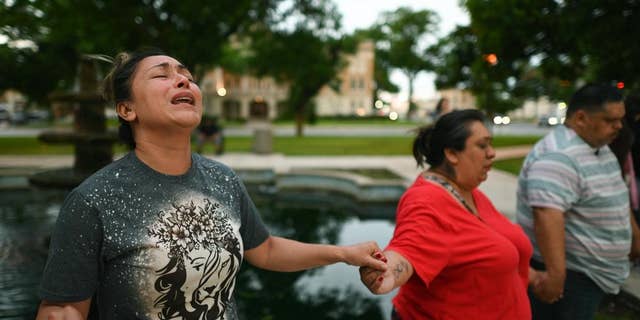
Kladys Castellón prays during a vigil for the victims of the mass shooting at Robb Elementary School in Uvalde, Texas, on Tuesday, May 24, 2022.
(Billy Calzada/The San Antonio Express-News via AP)
“Know your kids are listening and watching you,” Alvord said. “Parents think it’s just about the listening. They’re [also] watching facial expressions … [So] put on your oxygen mask first. Calm down, so then you can be available for your child.”
Said Dr. Meeker on this point, “If your child saw trauma and needs to talk about it explicitly, he or she needs to be able to do this.”
HOW PARENTS SHOULD TALK TO KIDS ABOUT GABBY PETITO: EXPERT WEIGHS IN
If this is “too tough for you to hear or you feel unable to adequately help your child, find a good counselor,” she advised.
Kathy Koch, PhD, an education psychologist in Fort Worth, Texas, and a faculty member with Summit Ministries (Summit.org), told Fox News Digital, “It’s important is for parents to put down the phone, eliminate distractions and be fully present.”
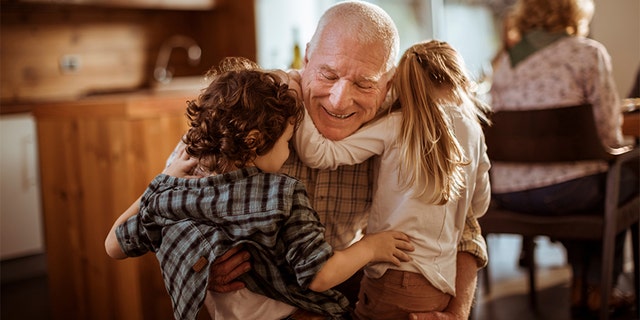
Close-up of a grandfather interacting with his grandkids. Said Kathy Koch, PhD, "Parents should listen to learn — and not to judge or quickly share their thoughts" when it comes to issues such as the Texas school shooting.
(iStock)
“Focusing on their kids and answering their questions with specific answers helps them know they are safe and that they can trust Mom and Dad in the future.”
She also said, “Parents should listen to learn — and not to judge or quickly share their thoughts.”
Avoid political talk with young kids
While adults may engage in spirited political debate, Dr. Alvord pointed out that young children won’t understand the meaning of gun control policies.
“Kids, depending on their age — if you are either for, against or somewhere in the middle — they’re exposed to hearing those things,” she said.
“The best thing to do is to explain your values, stick to the facts of what happened and don’t politicize it.”
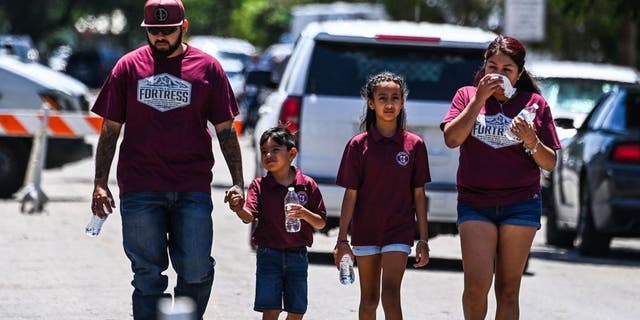
A victim’s family walks out of the Robb Elementary School in Uvalde, Texas, on May 25, 2022.
(CHANDAN KHANNA/AFP via Getty Images)
Alvord added, “But the older they are, the more they know.”
Dr. Meeker said it’s wise to protect children from repeatedly hearing about a trauma over and over again. “If your child has a phone, talk to him or her about getting off social media for 24 hours,” she said.
TEXAS SCHOOL SHOOTING SUSPECT SALVADOR RAMOS’ GRANDFATHER SAYS HE FEELS FOR VICTIMS, FAMILIES
Also, she said it’s smart to “tell your teens or children why you are recommending doing this so that they don’t feel you’re simply avoiding the issue — but rather that you are intentionally helping them cope in a healthy manner.”
Watch children for signs of stress
If you suspect the news of the shooting is affecting your children and they’re not speaking up about it, look for indications of heightened anxiety or sadness.
“Usually the marker is sudden changes in behavior — changes in eating, sleeping, irritability,” Alvord said.
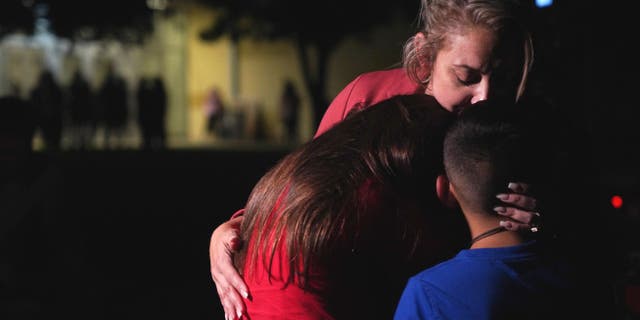
Families hug outside the Willie de Leon Civic Center where grief counseling is being offered in Uvalde, Texas. A teen gunman killed at least 19 children in a shooting at an elementary school in Texas on Tuesday, May 24, 2022.
(ALLISON DINNER/AFP via Getty Images)
“We think they’re acting out or it’s bad behavior, but it can be stress,” Alvord said, adding that parents should also look for physiological signs such as complaints of stomach aches. “With irritability, sometimes parents misinterpret.”
Remind kids that Americans are resilient
Alvord advised parents not to “catastrophize” the event in front of young children who may only comprehend how “scary” the situation is, she said.
“We learned a lot after the 9/11 [terror attacks] [about] family support and the community support around it,” Alvord said, adding that it’s still important to acknowledge sadness and grief.
A parent might say, “‘It is terrible, [but] you are here, you are safe and these are the things we are doing to stay safe,” she advised.
To demonstrate their resilience, people often take action.
Alvord said, “For young kids, that could be having a lemonade stand to raise money to help [the victims and their families].”
Teach your kids to pray
Dr. Meeker said that “giving children and teens access to God gives them a huge sense of security. Just because our culture doesn’t want God in our schools doesn’t mean that you, as a parent, shouldn’t teach your kids to pray when tragedy strikes,” she said.
DOES TEXAS SCHOOL SHOOTING HIGHLIGHT NEED FOR FAITH, HIGHER PURPOSE IN KIDS’ LIVES?
“Giving your kids something to do and an omniscient God to grab onto when life gets really tough will make a tremendous difference in their ability to overcome fear,” she also said.
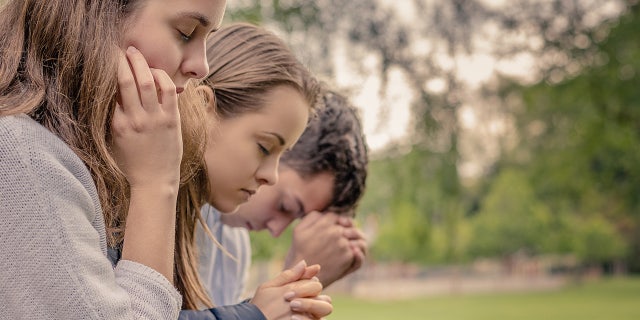
Friends pray together in a park. "We live in a world where bad things will happen. But that shouldn’t stop parents from equipping their kids and working with them to overcome challenging times," said Kathy Koch, PhD.
(iStock)
Added Dr. Koch on this point, “Parents can teach and talk about God and his truths — there are moral absolutes and right vs. wrong.”
“Just because our culture doesn’t want God in our schools doesn’t mean that you, as a parent, shouldn’t teach your kids to pray when tragedy strikes.”
— Dr. Meg Meeker
“Parents don’t need to couch their answers as their opinions,” she also said. “They should acknowledge that evil is evil — and how good people should respond.”
“It’s important for a parent to find relevant truth to share with their children about their thoughts and concerns. And if a parent doesn’t know the answer to a question, it’s OK to admit it.”
CLICK HERE TO GET THE FOX NEWS APP
Said Koch as well, “We live in a world where bad things will happen. But that shouldn’t stop parents from equipping their kids and working with them to not only overcome these challenging times — but to be healthy humans who push back against the darkness and evil.”








